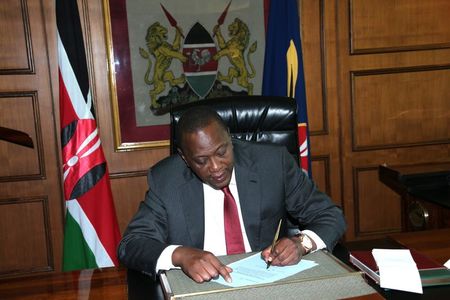By Thomas Escritt
AMSTERDAM (Reuters) - International prosecutors accused the Kenyan government on Tuesday of failing to hand over phone and bank records they said could help them show President Uhuru Kenyatta paid people to take part in post-election violence in 2007.
Kenyatta denies charges of co-orchestrating the wave of violence in which 1,200 people were killed and a government representative dismissed the prosecutors' allegations at Tuesday's hearing of the International Criminal Court.
His lawyers say the requests are a cover for a lack of evidence and the attempt to blame the government undermines Kenyatta's right to a fair trial.
On Wednesday, Kenyatta is expected become the first sitting head of state to answer a summons to the Hague-based court, where judges are considering whether drop the case against him or delay it pending the handover of the requested evidence.
It is a major test for the 11-year-old court, which has had a string of collapsed cases and been accused of singling out Africans for prosecution.
Court filings show up to a third of the prosecution witnesses against Kenyatta have withdrawn, with some cited as saying they had been intimidated by unnamed people. Kenyatta's legal team has also said that defence witnesses had been intimidated. Each side has rejected the other's claims.
Kenyatta, who was elected president last year, and his deputy William Ruto, are not under arrest and have obeyed all summons they have received relating to the separate but similar charges they face. Ruto also denies the charges against him.
Both have pledged their full cooperation with the court while leading a diplomatic push to have their cases dismissed.
"Unfortunately, unfounded and unproven accusations are the order of the day. My accusers, both domestic and foreign, have painted a nefarious image of most African leaders as embodiments of corruption and impunity," Kenyatta told parliament on Monday.
RIVALS
Kenyatta, from Kenya's biggest Kikuyu ethnic group, and Ruto, a Kalenjin, were in rival camps in the 2007 election race. They were accused of inciting gangs who butchered people from opposing groups, using machetes and bows and arrows.
Prosecution lawyer Ben Gumpert told judges the Kenyan government had not handed over phone records and three years of bank records the prosecution needed to corroborate witness testimony that Kenyatta had approached them to "finance or ultimately coordinate that violence."
"There is a considerable body of material that the prosecutor says could have been provided, should have been provided and which hasn't been provided," he told the court.
Representing the Kenyan government, Attorney-General Githu Muigai said authorities had cooperated to the extent permitted by domestic law and provided all information available.
Muigai said there were limits to what Kenyan authorities could do to obtain Kenyatta's records.
"Where it has been possible within the law to carry out an independent interrogation of the requested subject, we have done so," he said. He had transmitted three months of Kenyatta's banking records, he said.
Kenyatta's lawyers have always dismissed the requests for his bank and telephone records as a "fishing expedition" designed to cover up for prosecutors' lack of evidence.
"Whatever evidence we produced, further inquiries were suddenly made," Steven Kay, Kenyatta's lawyer, said.
Though there is no published witness list, judges said in September 2013 that prosecutors intended to call 30 witnesses, of whom two were expert witnesses.
During 2013, four witnesses withdrew, indicating to prosecutors they were no longer prepared to testify because of various concerns, including for their safety, according to prosecutors' heavily redacted court filings.
Another three withdrew over the course of 2013 because they were found to have lied, changed their stories or because they were no longer necessary to the prosecution's case. Three witnesses withdrew in 2012 out of fears for their safety, according to prosecution filings.
Presidential spokesman Manoah Esipisu dismissed any suggestion witnesses had been intimidated saying: "There is no proof, these are just allegations."
Kenyatta's lawyer Kay said it was "completely misleading and untruthful" to suggest that witness intimidation and government obstruction had undermined the case.
Judges are expected to rule on the future of the case at some point after Wednesday's hearing. Its collapse would be a severe blow to a court that has handed down just two guilty verdicts, both to little known Congolese warlords, and one acquittal since inception in 2003.

The court has struggled to make its writ run in many countries. Indicted suspects such as Sudan's President Omar al-Bashir or Saif al-Islam Gaddafi, son of the slain former Libyan leader, remain at large because their governments refuse to hand them over.
(Additional reporting by Edmund Blair in Nairobi, editing by Anthony Deutsch and Philippa Fletcher)
